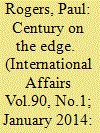| Srl | Item |
| 1 |
ID:
131417


|
|
|
|
|
| Publication |
2014.
|
| Summary/Abstract |
The article argues that the century from 1945 is likely to prove seminal in terms of human progress. It marks the period when the human community has to come to terms with its capacity for self-destruction through the invention of weapons of mass destruction and its ability to exceed the homeostatic capabilities of the global ecosystem in an era of deep socio-economic divisions. Two-thirds of the way through this century the progress has been mixed. Nuclear war has been avoided more by luck than by wisdom, there remain risks of nuclear proliferation and it is not evident that humankind has acquired the ability to deal with the destructive potential of bio-, nano- and other emerging technologies. Recognition of the extent of anthropogenic impacts on ecosystem stability is evident, but not at the level necessary for the radical responses required. Even so, there are signs of progress and potential for change, suggesting that the final one-third of the century will be singularly important in ensuring long-term emancipation and environmental sustainability.
|
|
|
|
|
|
|
|
|
|
|
|
|
|
|
|
| 2 |
ID:
092158


|
|
|
|
|
| Publication |
2009.
|
| Summary/Abstract |
Though the United States remains atop the world's power hierarchy, it is becoming less dominant, both because of the rise of new power centers and because the problems are becoming larger. The United States now must function in a world of relatively greater power equality and ever-larger problems springing from interdependence. The United States and China now have to look each other straight in the eyes, with the core of their relationship resting on the strategic foundation of stabilization-stabilization of the global economy, global ecosystem, and global security. This essay makes several additional points: (1) China has made some wise domestic and foreign economic policy decisions in the context of the great economic downturn of 2007-2009 that probably will increase the PRC's relative capacities coming out of the downturn; (2) US-China relations are more fundamentally sound than they have ever been before. Both nations' leaders should seize this opportunity to recast their relationship as partners in the effort to build coalitions to address the global system's most pressing challenges; and (3), even with a relatively sound strategic foundation for bilateral relations, when one moves from the general to the specific in important policy domains, it will be exceedingly difficult for Beijing and Washington to reach agreements on how to proceed on many key issues.
|
|
|
|
|
|
|
|
|
|
|
|
|
|
|
|